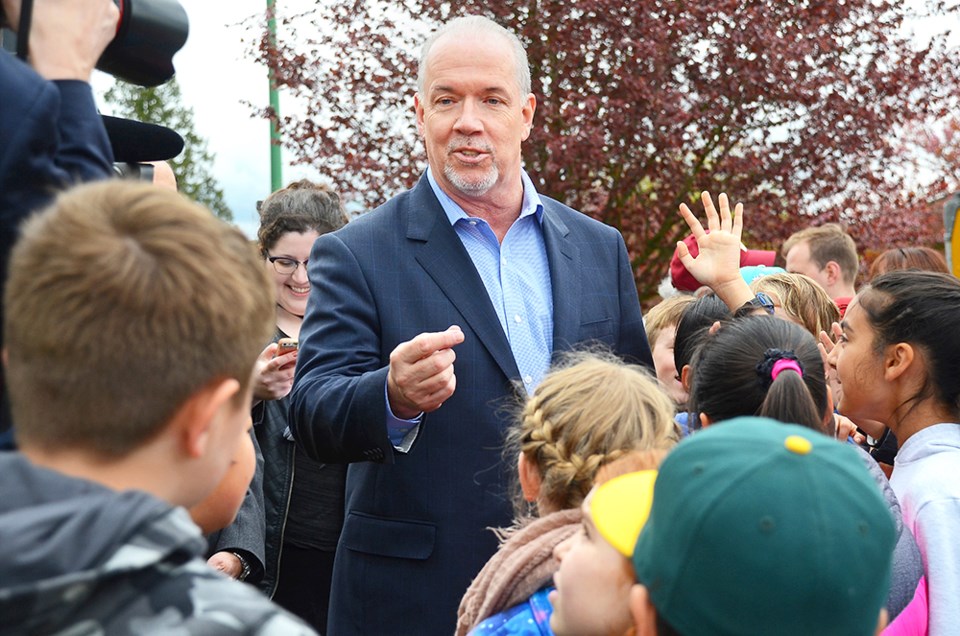I was kidding around with NDP leader John Horgan last week, pretending to have trouble saying the words “Premier Horgan” over and over again. He laughed and said he wasn’t used to hearing the title either.
But, unless something extraordinary happens over the next couple of weeks (such as an NDP MLA becoming seriously ill or hurt) we’re all going to have to get used to saying and hearing “Premier Horgan” when we talk about who’s running the B.C. government.
The idea of Horgan becoming premier seemed a bit remote just a few months ago. Not a longshot by any means, since B.C. elections are almost always close results, but the resiliency of the free enterprise coalition party has always proven to be impressive at election times.
Technically, Horgan lost the election because his party won fewer seats than the B.C. Liberals. But through the intricacies of our Westminster parliamentary system, Horgan appears ready to turn a loss into a political victory. He helped negotiate an agreement between his party and the B.C. Green Party, to win their support during confidence votes, without really offering anything to the Greens that wasn’t already in the NDP election platform.
Perhaps because they realized Green party leader Andrew Weaver could not deliver his three-member caucus to the B.C. Liberal fold, Horgan and his team simply had to sit tight make the Greens come to them if they wanted any proximity to power. Horgan stuck to his position on the Site C dam (refer it to the B.C. Utilities Commission) rather than ceding to Weaver’s demand that it be shut down now. He also rejected the Greens demand that a new electoral system be imposed, rather than put to the voters in a referendum.
In short, it’s hard to see what, exactly, the Greens got out of this deal other than the fact they’ll be consulted on things (though it’s not clear how much of that is real) and the carbon tax will begin to increase sooner than the NDP had planned. But Horgan pretty much stared the Greens down.
It was an impressive performance, and it follows a string of them.
I’ve noticed some subtle shifts in Horgan’s demeanour since the election campaign began. In the weeks and months leading up to it, Horgan at times seemed frustrated with the shackles that come with being in Opposition.
He was occasionally a bit chippy and defensive with the media, which he seemed to regard with suspicion. A fairly exuberant and confident figure, Horgan would often become defensive when challenged.But Horgan’s strong performance in the election campaign helped his party pick up enough seats to put it into minority government territory. He stayed on message throughout the campaign and rarely had a misstep (that radio debate “close encounter” with B.C. Liberal leader Christy Clark may have been the lone exception).
He even handled a heckler at a rally (which can go disastrously wrong) with aplomb and humor for the television cameras, and he seemed relaxed throughout the campaign, no mean feat to start with.
Since the uncertainty of election night, Horgan has maintained his cool and has presented a calm, authoritative and credible demeanour. If he can maintain it through the inevitable controversies that befall all government regardless of party stripe, he may be able to hold this somewhat shaky alliance with the B.C. Greens together longer than many people seem to think.
This apparent turnaround coincides with two relatively recent additions to his team to his team: Chief of Staff Bob Dewar, who arrived last year, and Deputy Chief of Staff Marie Della Mattia, who appeared on the scene at the start of the campaign. Both are veteran politicos with plenty of winning political experience, and they seemed to have had a positive impact on the NDP leader.
Dewar is a former chief of staff in a Manitoba government and Della Mattia is a longtime communications and political consultant with a few victories notched on her belt.
It’s not entirely clear yet whether Dewar and Della Mattia intend to stick around. Horgan should do his utmost to ensure neither depart the scene if he wants his apparent one-seat majority to last a good length of time.
Keith Baldrey is chief political reporter for Global B.C.



